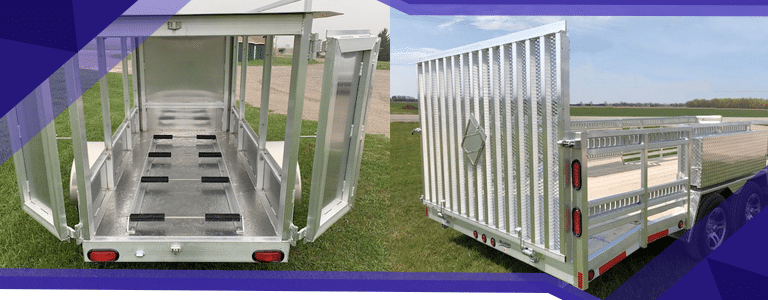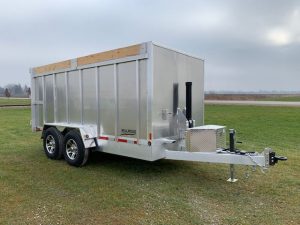
July 20, 2020 Last updated on June 16, 2023 by Bob Fisher Bob Fisher Custom Trailer
If you are buying a trailer, the size is one of the most important factors to consider. Whether you order an already-made trailer or a custom one, you need to pick both the capacity and dimensions. At Millroad Manufacturing, we build custom aluminum trailers to order. When you need a high-quality trailer, we will help you find the perfect size for your needs.

There are several factors you should consider when selecting a trailer size. You want to be sure that it will be able to handle your cargo. However, it is also important to find one that fits practically into all your use cases.
First, think about the physical size of the loads you will usually be carrying. Ideally, you should have a trailer that can comfortably manage your common cargo. Remember that there will likely be some variance in your needs. Avoid buying a trailer that perfectly fits your needs today but will be inadequate in the near future.
Another important characteristic is the gross vehicle weight rating. This is the maximum amount of weight that the trailer can safely support. Remember that this includes the weight of the trailer. A 400-pound trailer with a 1,400-pound GVWR can safely carry 1,000 pounds. Aluminum trailers are much lighter than steel ones. Therefore, they can handle more cargo with the same GVWR.
This needs to be considered separately from the load size because, for example, a cubic yard of gravel weighs more than a cubic yard of pine wood. Again, try to predict your realistic maximum load weight. Of course, you don’t want to buy a high-capacity trailer to use once per year when you are carrying half as much the remaining days.
Your towing vehicle also has a GVWR. Remember that the vehicle and trailer weight needs to be calculated into your towing vehicle considerations. There is not much point in having a 5,000-pound trailer when your tow vehicle can only manage 1,500 pounds. Most trailer users already own their vehicles. However, even if you are purchasing one new, you should think about its GVWR.
Finally, keep in mind that you will need to drive the trailer around, park it and (possibly) store it for part of the year. Naturally, large trailers are typically harder to move and store. The mount can also impact this. Gooseneck mounts are much more manoeuvrable than bumper-pull hitches, for example.
As a rule of thumb, your trailer should be large enough to handle your cargo and no larger. Accurately predicting what you will use your trailer for is the most important step in planning the size of your custom aluminum trailer.
Choosing an appropriate size for your needs is a matter of safety and performance. Unsurprisingly, having a trailer that can’t handle the weight of the cargo you are hauling can be very dangerous. Furthermore, an overly heavy trailer minimizes the amount of cargo you can carry safely. Of course, underestimating or overestimating your trailer size needs also leads to poor performance. Excessively large trailers are hard to move around and heavy, while trailers that are too small require some “creative” stowing techniques for your cargo.
When you are ready to order a trailer, contact Millroad Manufacturing. We will work with you to help ensure that your custom aluminum trailer is the right size for your needs. Check out our trailer types to get a sense of the capacity of different sizes. We can also add extra axles or deck space according to your needs.